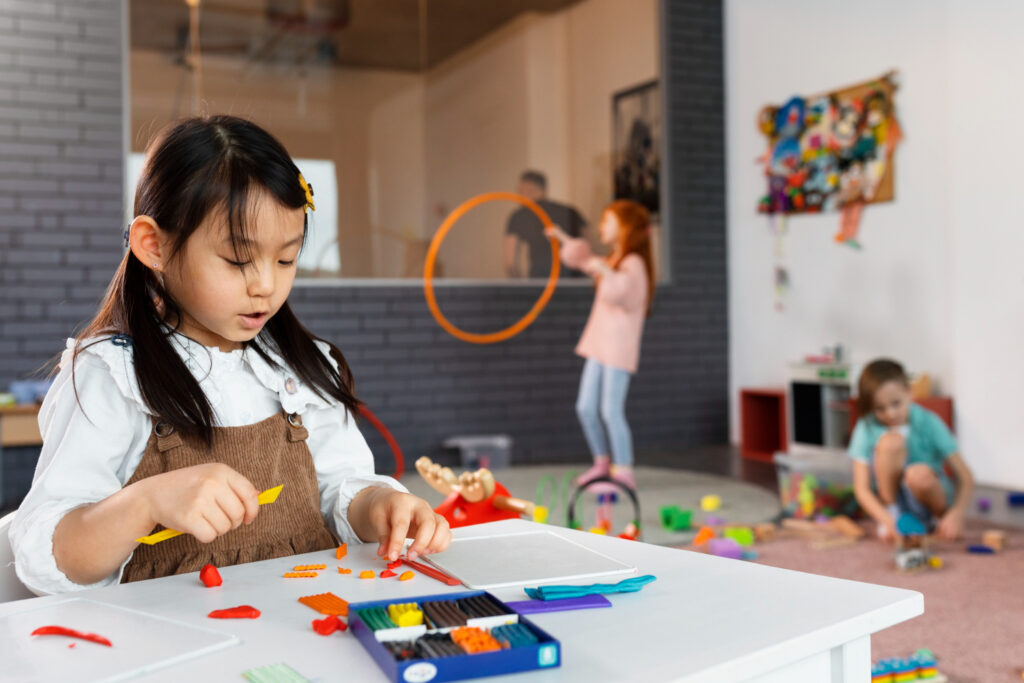Kindergartens are rapidly evolving as the future of early childhood learning, embracing a progressive and holistic approach to education. Each international school offers a rich, culturally varied atmosphere where kids get exposed to varied languages, encouraging early multilingualism and extending cognitive ability. International kindergartens emphasise academic success while promoting mental, emotional, and cultural evolution.
This article will highlight how these institutes can reform early childhood education and enable children to grow and thrive in an interconnected global society. Let’s start by understanding the different ways kindergarten education can shape a child’s early learning journey.
The Importance of Early Kindergarten Education
Early kindergarten education is vital in a child’s educational career. Here are some ways it can contribute to a successful academic journey while inspiring a passion for learning and growth:
- Preparation for Further Learning:
Early kindergarten learning establishes the foundations for future academic achievement by fostering fundamental abilities and a love of learning. It prepares kids for formal schooling, facilitates a smooth transition, and promotes independence, guaranteeing they are ready to face challenges.
- Early Language Acquisition:
Learning language from early years is critical to cognitive growth and excellent communication abilities. Kindergarten improves vocabulary, understanding, and relationship building. Learning different languages early on improves mental agility and cultural sensitivity. It builds a sound basis for academic achievement while shaping confident communicators.
- Parental Involvement and Support:
Parental engagement and support in kindergarten are critical to children’s development. Active engagement improves learning, rewards positive behaviour, and deepens the home-school relationship. Engaged parents offer emotional and curricular support, creating a loving atmosphere that enhances children’s learning outcomes.
Significant Benefits for Kindergarten Learning for Young Learners
Listed below are the most notable advantages your kids can enjoy by beginning their learning journey at an international kindergarten:
- Early Literacy Development:
Early literacy development is important for the educational growth of a child. It starts with fundamental language exposure, like conversing and reading with kids. Storytelling, alphabetical games, and stimulating reading activities help children recognize letters, learn spelling, and expand their vocabulary.
Early literacy helps promote curiosity, cognitive development and creativity. Children develop confidence in their abilities to read and write, shaping the path for future educational success. Investing in international kindergarten ensures kids receive the necessary tools to succeed academically.
- Social Skills Enhancement:
Enhancing a child’s social skills in the early years is essential for personal development. Kindergarten is a regulated setting where kids connect with their classmates and gain vital abilities like sharing, collaboration, and empathy. They develop conflict resolution and collaborative skills via group activities and play.
These experiences enable students to comprehend social norms and form positive connections. Enhanced social skills promote self-confidence and emotional stability, allowing children to negotiate complicated social contexts successfully and thrive in diverse societal communities.
- Fine and Gross Motor Skills:
Fine and gross motor abilities are critical during early childhood development. Fine motor abilities support the usage of fingers and hands for tasks like writing, drawing, painting, sculpting, and building blocks. Accuracy and hand-eye coordination are improved because of these abilities.
Running, climbing, and jumping require gross motor abilities involving bigger muscle groups. These abilities are essential for optimal physical wellness, balance, and coordination. Developing fine and gross motor abilities during early school aids in preparing children for future cognitive and physical tasks.
- Emotional Self-Regulation:
Emotional control refers to children’s ability to manage and react to their emotions healthily. Kids learn this vital skill in an international school, helping them to recognise and comprehend emotions, manage impulses, and adjust emotions to new surroundings. Mastering emotional self-regulation is critical for social relationships, academic performance, and overall wellness.
Kids with self-regulating abilities are better equipped to deal with stress, manage disputes, and make informed decisions. Mindfulness, mindful breathing, and affirmations are all techniques that can help develop this ability and foster individual growth.
- Intercultural Awareness:
The recognition and awareness of cultural disparities and parallels is what intercultural understanding is all about. It involves acknowledging one’s cultural viewpoints while remaining open and supportive of other customs and beliefs. Intercultural awareness promotes successful communication and reduces biases in diversified settings.
It is vital in today’s globalized community as it fosters compassion, partnership and respect among varied cultures. Individuals who embrace intercultural awareness can negotiate multicultural contexts, helping to create inclusive, cohesive, and open-minded communities locally and worldwide.
- Imagination and Originality:
Creativity and individuality in kindergarten are vital for promoting children’s artistic abilities. Kids can freely explore ideas and express themselves with imaginative play, storytelling, and creative activities. This early reinforcement of creativity nurtures a love of learning and fosters confidence in one’s capabilities.
Kindergartens foster a feeling of self-worth by honouring children’s unique contributions. These fundamental experiences build imaginative thinkers and adaptable individuals. They’ll become ready to face subsequent challenges with creative thinking and confidence, resulting in a dynamic society.
Conclusion
International kindergartens are the future of learning, embracing a modern approach that prepares children for an ever-changing society. Each international school nurtures cultural diversity, linguistic diversity, and social preparedness from an early age. They remove cultural barriers fostering the feeling of one community and preparing children for a successful future. International kindergartens guarantee that kids flourish in diverse contexts, resulting in a brighter, happier tomorrow.


